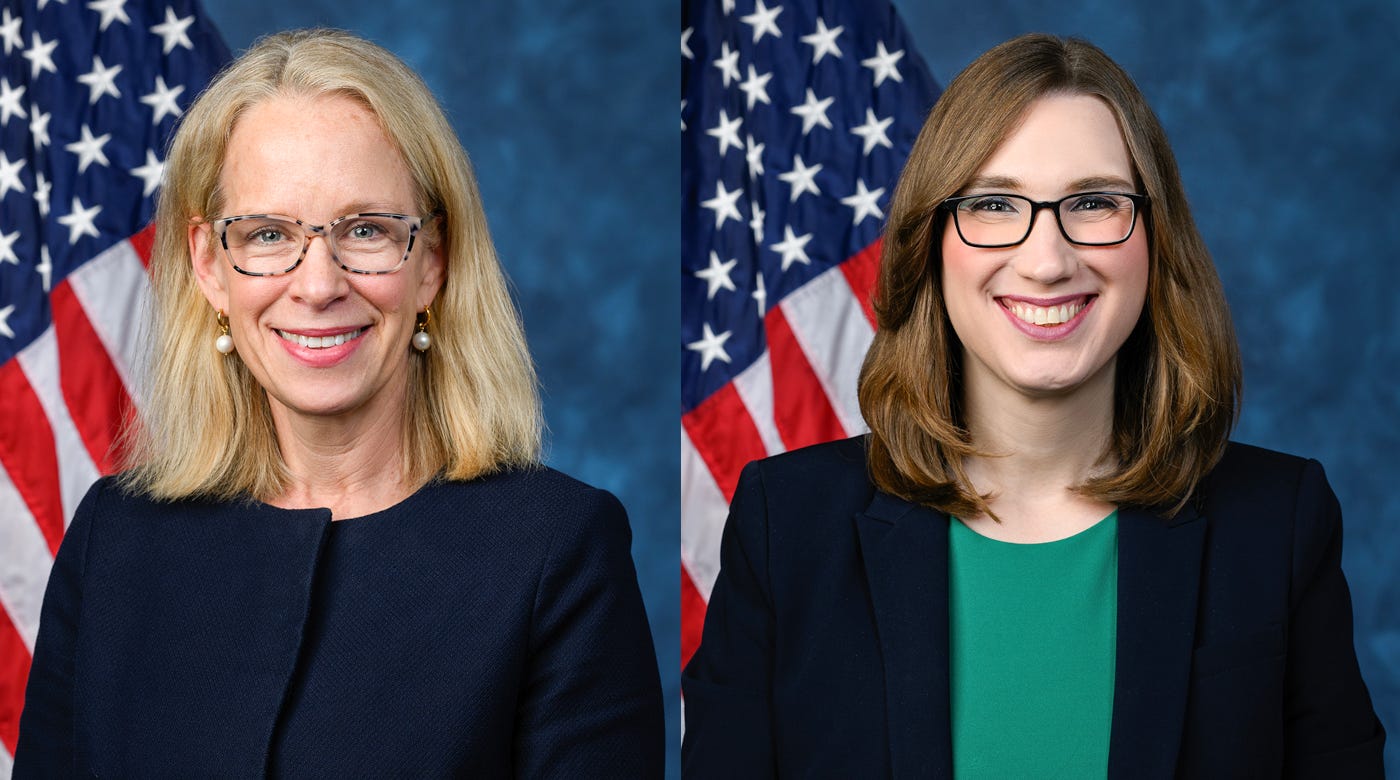The Congressional Freethought Caucus adds yet another two members
The group, which champions reason-based policies and opposes discrimination against atheists, now stands at 32 members
This newsletter is free and goes out to over 22,000 subscribers, but it’s only able to sustain itself due to the support I receive from a small percentage of regular readers. Would you please consider becoming one of those supporters? You can use the button below to subscribe to Substack or use my usual Patreon page!
The Congressional Freethought Caucus has added another two members: Rep. Kelly Morrison (D-MN) and Rep. Sarah McBride (D-DE):
Morrison is a practicing OB-GYN and Yale graduate who served in the Minnesota State House (2019-2023) and State Senate (2023-2024) before running for the U.S. House last year. She ended up taking the seat of Democratic Rep. Dean Phillips, who attempted a long-shot primary campaign to unseat President Biden. (That attempt went nowhere, though Biden said after the primary that he would not continue his campaign.) Morrison later won her race by a comfortable 17-point margin. She now sits on the House Committees on Small Business and Veterans’ Affairs.
McBride made history as the first openly transgender member of Congress earlier this year, after serving four years in the Delaware State Senate. Before that, she worked for the Human Rights Campaign. She has been targeted by her Republican colleagues who have repeatedly and purposely misgendered her and passed a bill banning her—her specifically—from using the proper bathroom on Capitol Hill. To the chagrin of many progressives, McBride just accepted it, saying she’s “not here to fight about bathrooms.” For better or worse, she has calculated that being a moderate Democrat who doesn’t fight for trans rights at a time when those rights are in peril is her preferred path forward. She now sits on the House Committees on Foreign Affairs and Science, Space, and Technology. She is also a member of the Congressional Progressive Caucus and Equality Caucus.
Like most of their colleagues in the CFC, Morrison and McBride are religious. The Pew Research Center, in their 2025 roundup, listed Morrison as a non-denominational Protestant and McBride as Presbyterian (in fact, she’s an ordained Presbyterian elder). That doesn’t prevent them, of course, from supporting church/state separation and protecting freedom of religion for everyone (including the non-religious).
The caucus now includes 32 members, all of whom are Democrats. As of this writing, neither person has made any public announcements about their CFC affiliation. McBride’s acceptance was confirmed via the American Humanist Association.
In case you need a refresher, the CFC was first announced in 2018 by Rep. Jared Huffman, currently the only openly Humanist member of Congress.
The 32 members now include:
Rep. Jared Huffman (D-CA) (Co-cha)
Rep. Jamie Raskin (D-MD) (Co-chair)
Rep. Mark Pocan (D-WI)
Rep. Rashida Tlaib (D-MI)
Rep. Pramila Jayapal (D-WA)
Rep. Steve Cohen (D-TN)
Rep. Hank Johnson (D-GA)
Rep. Zoe Lofgren (D-CA)
Rep. Sean Casten (D-IL)
Del. Eleanor Holmes Norton (D-D.C.)
Rep. Don Beyer (D-VA)
Rep. Jimmy Gomez (D-CA)
Rep. Julia Brownley (D-CA)
Rep. Kevin Mullin (D-CA)
Rep. Jan Schakowsky (D-IL)
Rep. Greg Casar (D-TX)
Rep. Robert Garcia (D-CA)
Rep. Maxwell Frost (D-FL)
Rep. Becca Balint (D-VT)
Rep. Eric Swalwell (D-CA)
Rep. Lizzie Fletcher (D-TX)
Rep. Laura Friedman (D-CA)
Rep. Andrea Salinas (D-OR)
Rep. Emily Randall (D-WA)
Rep. Yassamin Ansari (D-AZ)
Rep. Jerry Nadler (D-NY)
Rep. Judy Chu (D-CA)
Rep. Delia Ramirez (D-IL)
Rep. Suzanne Bonamici (D-OR)
Rep. Chris Deluzio (D-PA)
Rep. Kelly Morrison (D-MN)
Rep. Sarah McBride (D-DE)
To be clear, this isn't an “atheist club” for Congress, as some critics have suggested. This is just a group of lawmakers dedicated to promoting reason-based public policy, keeping church and state separate, opposing discrimination against non-religious people, and championing freedom of thought around the world. There’s really no reason anyone should be against this. That’s why there’s nothing hypocritical about the fact that nearly every member of the Caucus is religious.
The hope is that the membership continues growing—making the Caucus more influential—while the stigma of being an atheist (or even being associated with non-religiosity) decreases across the country. Those two things are more closely linked than we might imagine. Keep in mind that the Congressional Prayer Caucus, which typically promotes a version of conservative Christianity, is much larger and has members from both major parties. By that metric, the Freethought Caucus has a long way to go.
As I’ve said before, perhaps the most shocking thing about the Caucus is that, based on the relative lack of media interest, people don’t seem to care who the members are… which is to say, no one—not even in right-wing media—thinks it’s a big deal for sitting House members to align with a group defending atheists.
That also means none of these lawmakers believes the Caucus will be a concern for them during the second Trump administration. That may come as a shock to anyone who remembers a time when aligning (even remotely) with atheism was considered one of the biggest taboos in politics.
(Portions of this article were published earlier)


Not a Republican on the list. A real shocker, I know. Republicans pander to the preachers and view human decency as a character flaw. Critical thinking is the worst possible sin in the eyes of most of these people.
The Freethought Caucus needs to be an order of magnitude larger before the NSGOP will take them seriously. Why are there no Republicans? Because the NSGOP doesn't value freedom of thought. They want to make their ideology the only ideas allowed. They would like to have thought police, where you can be locked up for insufficient loyalty to der OrangeFührer.